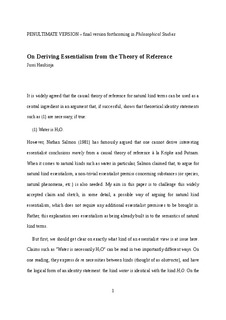On Deriving Essentialism from the Theory of Reference
Journal article, Peer reviewed
Permanent lenke
http://hdl.handle.net/11250/2393062Utgivelsesdato
2014-08Metadata
Vis full innførselSamlinger
Sammendrag
Causal theories of reference for natural kind terms are widely agreed to play a central role in arguments for the claim that theoretical identity statements such as “Water is H2O” are necessary, if true. However, there is also fairly wide-spread agreement, due to the arguments of Nathan Salmon (in Reference and Essence), that causal theories of reference do not alone establish such essentialism about natural kinds: an independent, non-trivial essentialist premise is also needed. In this paper I will question this latter agreement. I will argue that there is an independently attractive explanation of why such identity statements are metaphysically necessary, if true: an explanation which relies on assumptions about the semantics of natural kind terms, general philosophical assumptions about reference, and straightforward empirical assumptions, but presupposes no non-trivial essentialist premises.
